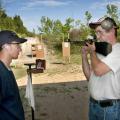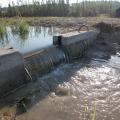Feature Story from 2010
MISSISSIPPI STATE – Mississippi cattle producers have until Aug. 17 to register for a Aug. 24-25 pasture and forage short course being offered by Mississippi State University.
The two-day workshop costs $100 per person or $75 each if two or more people from the same farm or organization attend. The fee covers the training, the Mississippi Grazing Manual and other educational materials, and meals. The event will be held at MSU’s Bost Conference Center.
By Patti Drapala
MSU Ag Communications
MISSISSIPPI STATE – Mississippi dairy farmers have been good mentors to youth who participate in the 4-H Dairy Cattle Project, but the continuing decline in dairy farms across the state has reduced the number of people who serve as sources of information.
By Karen Templeton
MSU Ag Communications
MISSISSIPPI STATE -- Homemade baby food gives parents the advantage of controlling what goes into their babies’ sensitive stomachs and provides health benefits for the entire family.
BILOXI – Recreational boating in the Gulf and along coastal waterways is becoming more of a challenge, especially during high-traffic weekends, as the oil spill expands to impact more than just fishing opportunities.
Dave Burrage, Extension professor at Mississippi State University’s Coastal Research and Extension Center, said there are no restrictions to prevent pleasure craft on the Gulf, but boaters need to use common sense.
MISSISSIPPI STATE – Youth with a passion for photography, drama, writing, technology or robotics should register for Mississippi State University’s annual 4-H Technology and Expressive Arts Camp scheduled for July 27-28.
Registration is $65 for day campers, which includes supplies and meals. Those who choose to stay overnight will pay a $175 registration fee. Spaces are limited.
VERONA – The North Mississippi Research and Extension Center’s biannual Agronomic Row Crops Field Day will present the latest research to the area’s row-crop farmers and consultants.
The field day will be held from 8 a.m. to 1:30 p.m. on Aug. 5 at the Lee County Agri-Center on Highway 145 South in Verona.
The program will include educational and industry exhibits and field research plot tours. This year’s featured speaker will be Mississippi Commissioner of Agriculture and Commerce Lester Spell.
MISSISSIPPI STATE – The apartments of many college students may not look like they contain wealth, but students who have had to replace everything after a loss face a significant financial burden.
Bobbie Shaffett, family resource management specialist with the Mississippi State University Extension Service, said a large majority of renters, a group that includes many college students, do not carry renter’s insurance.
MISSISSIPPI STATE -- Mississippi schools should benefit from all they learned during last year’s H1N1 pandemic flu.
Jane Clary, health specialist with Mississippi State University’s Extension Service, said even though the worst of the pandemic appears to be behind us, schools should keep flu prevention efforts in place for the upcoming season.
By Patti Drapala
MSU Ag Communications
MISSISSIPPI STATE – More Mississippi youth will have access to after-school programs because of an effort by Mississippi State University’s 4-H program to train providers who can reach these children.
MISSISSIPPI STATE – Students struggling with ideas for school projects or future careers may only need to look at their newspaper to find topics that interest them.
Many Mississippi State University faculty members can trace their research careers back to science fair projects on topics that were new at the time but have continued to hold their interest for many years. One such topic this year could be the Deep Horizon oil spill in the Gulf of Mexico.
MISSISSIPPI STATE -- Rain barrels are gaining popularity, as they can save both pocket change and the environment.
“There are a lot of good reasons to use rain barrels,” said Tom Cathcart, professor of environmental engineering in Mississippi State University’s Department of Agriculture and Biological Engineering. “Generally, for a residential property, it is the house that creates the large majority of displaced stormwater during a rain event. Managing this displaced water at the source is the best management practice we have.”
MISSISSIPPI STATE – When Julian Watson decided to turn his erodible farmland into a tree farm, he had no idea that 24 years later he would be so widely recognized for his efforts.
Watson’s grandparents purchased the land in 1872. When Watson inherited it, he focused on trying to prevent erosion. The 1,100-acre parcel was washing away at a rate of 30 to 50 tons of topsoil per year.
MISSISSIPPI STATE – Individuals interested in learning about the latest research and development of plant materials into biofuel should attend Mississippi State University’s 2010 Biofuels Conference Aug. 12-13 in Jackson.
The annual conference will be at the Hilton Jackson Hotel, located at the intersection of I-55 and County Line Road. Participants can register online at http://www.biofuelsconference.msstate.edu/registration.
MISSISSIPPI STATE – The castor plant thrives in Mississippi and produces great quantities of valuable oil in its seeds, but it has a reputation that a team of researchers at Mississippi State University are trying to address.
Castor oil is the highly desirable, plentiful product of castor beans. The oil is used to produce everything from cosmetics and paints to jet aircraft lubricants and certain plastics. Generations ago, it was given by the spoonful as a laxative and used as a home remedy to treat a range of maladies.
By Karen Templeton
MSU Office of Ag Communications
MISSISSIPPI STATE – Focusing on safety, developing life skills and teaching good sportsmanship have made Mississippi’s 4-H Shooting Sports program popular with youth.
MISSISSIPPI STATE – A veterinary student at Mississippi State University doing grant-funded research on the immune system of dogs received the highest award given for her presentation in an international competition.
Claire Fellman, a fourth-year MSU College of Veterinary Medicine student from Ocean Springs, received a Morris Animal Foundation Veterinary Student Scholars grant last year to study immunosuppression in dogs.
MISSISSIPPI STATE -- In 1985, a young and energetic Mississippi State University forest products professor began testing a new treatment on railroad crossties. At the time, Terry Amburgey had little notion that his experiment would change railroad infrastructure almost 25 years later.
By Alicia Barnes
For MSU’s Ag Communications
MISSISSIPPI STATE – Until a few weeks ago, Jason Edmonds had not eaten beef in nearly three years.
Citing concerns over animal welfare, his personal impact on the planet, and added hormones and antibiotics, Edmonds adopted a vegetarian lifestyle for years, until finding access to local farmers who share his concerns.
MISSISSIPPI STATE – A Mississippi State University study has confirmed the success of a new technique to reduce nutrients in runoff water and protect downstream waters, including the Gulf of Mexico.
Weirs, also known as check dams, are small dams used to collect water runoff from agricultural fields. Weirs are often the size of a drainage ditch, with a 2-foot channel in the center for water drainage. The weirs are concrete can be moved to various locations in a drainage ditch.
BAY ST. LOUIS – An upcoming conference will provide a chance for the rural tourism community to meet the challenges they face in the upcoming months.
Rachael Carter, a community-instituted planning specialist with the Mississippi State University Extension Service, said the Miss-Lou Rural Tourism Association is working hard to bring together those involved in tourism and community and economic development in rural Mississippi and Louisiana to increase tourism in these areas.
Pages
Feature Story Archive
- 2025 (64)
- 2024 (116)
- 2023 (114)
- 2022 (112)
- 2021 (104)
- 2020 (140)
- 2019 (126)
- 2018 (141)
- 2017 (197)
- 2016 (240)
- 2015 (319)
- 2014 (355)
- 2013 (371)
- 2012 (343)
- 2011 (246)
- 2010 (236)
- 2009 (229)
- 2008 (188)
- 2007 (210)
- 2006 (199)
- 2005 (224)
- 2004 (215)
- 2003 (228)
- 2002 (176)
- 2001 (184)
- 2000 (188)
- 1999 (180)
- 1998 (178)
- 1997 (188)
- 1996 (58)
- 1995 (36)










